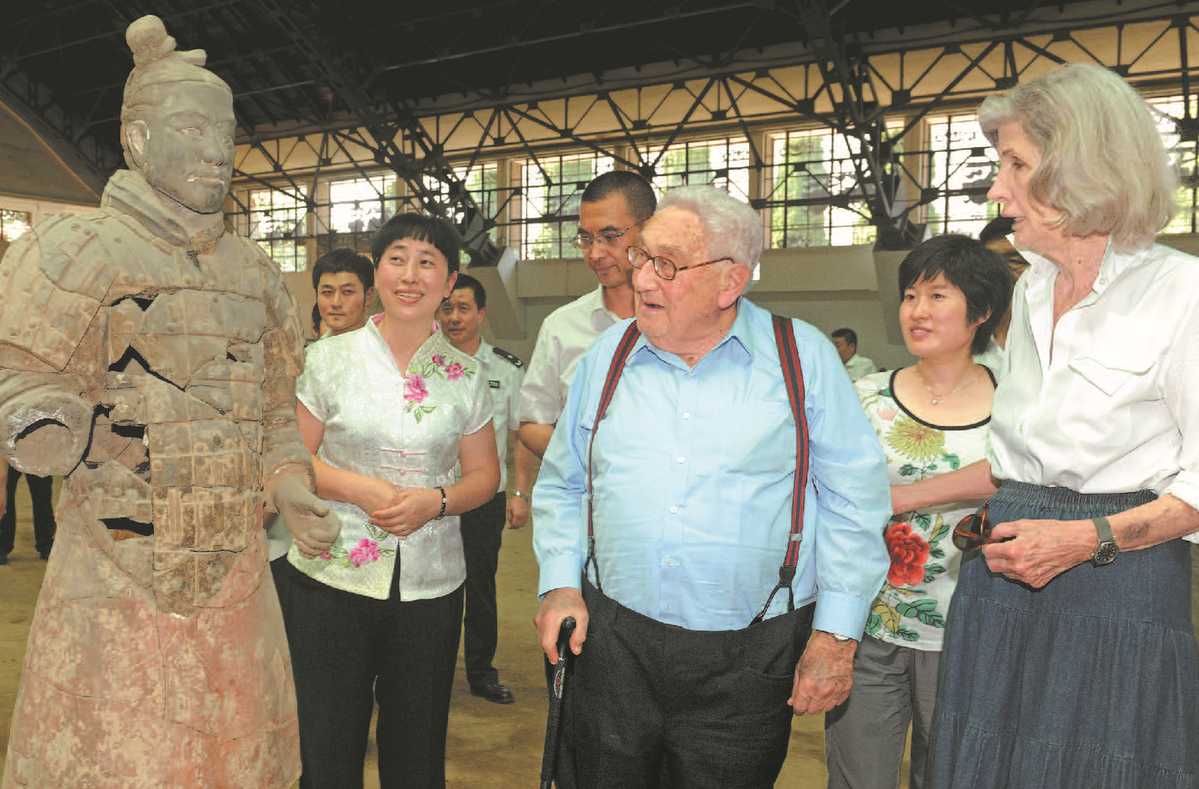The life and times of Dr K the conciliator
As a young man, he was exposed to the ravages of tyranny and war, and he would later champion the cause of bringing two nations together


Editor's note: Until his death on Nov 29 at the age of 100, Henry Kissinger, whose private memorial service was held on Thursday in New York, remained a fervent friend of China. Here we look at his life and legacy.
In his book Travels With Henry, veteran US journalist Richard Valeriani describes a scene in which Henry Kissinger, national security adviser and later secretary of state to president Richard Nixon, "walked in on some elaborate State Department setup on the road". "He would invariably ask, 'Who are all these people?' And then he would point out with some disdain, 'I opened up China with five people,'" Valeriani wrote.
"He was a different man in China," wrote the international affairs reporter, who "jetted over half a million miles (804,000 kilometers)" with Kissinger, watching him "negotiating his way through Moscow, Peking (Beijing), Cairo, Jerusalem and many other world capitals".
Kissinger, who played a key role in laying the foundations for today's international geopolitical structure by building what he called "the world's most consequential bilateral relationship", died at his home in Connecticut on Nov 29. He was 100.
By helping to end more than two decades of hostility between the United States and China, Kissinger also succeeded in drastically changing the US' public perceptions of the world's most populous country at that time and in " (putting) before our people a vision transcending the travails of the Vietnam War and the ominous vistas of the Cold War", said Winston Lord, Kissinger's former top aide, one of those the secretary of state had in mind when he talked about "five people".
"Henry's demand for excellence could have a chilling effect on people who worked for him," said Lord, who at dawn on July 9, 1971, was sitting with Kissinger and two other US people on a Pakistani plane as it skirted the planet's second-tallest peak before entering Chinese airspace.
"Yet for those of us who lasted with him, Henry stretched their patience but also their perspective. He extended my horizon, and the sights were sublime, literally."
The secret visit, which catapulted Kissinger to international fame, would be followed by Nixon's groundbreaking visit to China in February 1972 and by "many consuming years of agony and ecstasy" in which Lord would watch Kissinger "whiffing ping-pong balls beneath golden rooftops arching to the heavens" and inform him during one of his rare bedridden stints that "your staff has voted for you to remain ill for another day so that they can get some rest".
"Henry was prone to occasional outbursts against his staff… he usually found a way to circle back with a sheepish gesture," Lord wrote in his foreword to the book Kissinger on Kissinger, which comprised a number of riveting interviews Lord did with his mentor between 2015 and 2016. The Chinese translation of the book has recently hit shelves in China.
"Beneath his carapace lies a gentle soul," Lord said.
That gentle soul was once trampled by the heavy boots of Nazi soldiers. In 1938, five years after Adolf Hitler became chancellor of Germany, Kissinger, then 15, fled his hometown of Fuerth, northern Bavaria, with his Jewish parents and younger brother. He would wait for six years to set foot on German soil again, this time as a US Army intelligence officer. Years later, in a homecoming that was perhaps even more triumphant, Kissinger the national security adviser, after noticing that "visiting relatives" was on the official calendar, told his aides, "My relatives are soap."
"Maybe what my European origin has done for me is to help me understand that not all things are possible, and that nations can suffer tragedies if they do not act with wisdom and dedication and foresight," said Kissinger, who later said he regarded "the ability to project beyond the known" as a touchstone of his policymaking.































